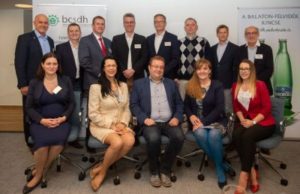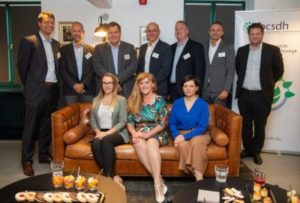Moving into the 21st year of their partnership, Siemens and the Budapest University of Technology and Economics (BME) are expanding their cooperation: several partner companies of Siemens Group are joining the framework contract extended for another five years. At the signature ceremony of the agreement the leaders of these companies also shared their plans and objectives regarding the partnership.
The partnership between the Budapest University of Technology and Economics and Siemens started 20 years ago, in 1999 with the aim of providing the opportunity for professional development to the next generations, supporting the training of future engineers. The two organisations renew their cooperation every five years so with this present, i.e. fifth contract they have 20-year experience regarding their partnership.
This occasion is special as several partner companies of the Siemens Group have joined the cooperation this year, emphasizing that it is of utmost importance for the company to contribute to the further improvement of engineer training. Siemens Mobility Kft. engaged in traffic systems, Siemens Gamesa Renewable Energy Kft. dealing with renewable energy and evosoft Hungary Kft. operating as a software developer are all committed to the professional support of engineering students.
The framework agreement concluded for the period of 2019-2023 was signed today at the signature ceremony by Dr. János Józsa Rector and Attila Kotán Chancellor on behalf of BME; Dale A. Martin, CEO of Siemens Zrt.; Dr. László Ludvig, Managing Director of Siemens Mobility Kft.; István Petényi, Managing Director of evosoft Hungary Kft.; and Péter Albrecht, Managing Director of Siemens Gamesa Renewable Energy Kft.
“I am happy and proud that BME and our group make the mutual decision year by year to continue this exemplary cooperation, benefitting not only the organisations concerned but also the students and the whole country. We are placing great importance on the infrastructural support of university and student projects also this year, helping students to obtain internship positions and employment in order to enable them to develop their talent, and we are still supporting innovative student ideas and programmes,” said Dale A. Martin, the CEO of Siemens Zrt.
“Without strong, reciprocal industrial cooperation, the University of Technology would not experience this expected, satisfying, steady progress. In all this, Siemens has been our key partner for two decades now. Our joint results speak for themselves but we need to relentlessly establish the grounds for future success today as it is not born of its own accord. The ongoing maintenance and expansion of relations for the development of new technologies and methods guarantee the success of our joint innovation activity,” said Dr. János Józsa, Rector of the Budapest University of Technology and Economics.
“Siemens Mobility Kft. was the first to support the programme of the Budapest University of Technology and Economics and the Karlsruhe Institute of Technology providing a dual degree. Our company awards scholarships to six talented computer engineer and electrical engineer students winning Mobility’s competition for one or two semesters. We know that tomorrow’s professionals are sitting at the school desks; it is worth finding and supporting them even during their training. We are proud that we can make it possible for these young people to gain experience in the latest technologies even during their university years thanks to our scholarship; we count on them during and after their studies to participate in the research of innovative solutions,” highlighted Dr. László Ludvig, Managing Director of Siemens Mobility Kft.
“As a knowledge-based company, we consider it an essential part of our mission to pass down the expertise of our engineers and computer scientists to the future engineers. We believe that it is a mutually beneficial cooperation to support the students’ practical education and provide them with state-of-the-art technologies to help them gain knowledge. They may drive our company in the future and they hold the promise of our future,” pointed out István Petényi, Managing Director of evosoft Hungary Kft.
“Our key strategy is to bring activities with increasing added value from the international arena to Hungary. To ensure its best implementation, we must keep an eye on the future generation of engineers and make every effort to guarantee they have the knowledge that later on may be important to, apart from the Hungarian society, our company. We also strongly support the cooperation and are happy to be part of this initiative,” said Péter Albrecht, Managing Director of Siemens Gamesa Renewable Energy Kft.
The two parties took their partnership to a higher level in 2016: Siemens was the first in Hungary to start a dual technical master’s degree programme in cooperation with the Budapest University of Technology and Economics. The theory is taught to the participating students at the university, while they become acquainted with the practical expectations of the labour market at Siemens. Siemens will continue to concentrate on supporting the professional talents of the next generation of employees in the most possible areas.








 This problem needs joint efforts to be tackled effectively. Water management authorities, civilian and industry players – the National Directorate General for Water Management, Plastic Cup and Coca‑Cola Hungary – announced jointly in the summer of 2019 that they were prepared to manage the challenge collectively.
This problem needs joint efforts to be tackled effectively. Water management authorities, civilian and industry players – the National Directorate General for Water Management, Plastic Cup and Coca‑Cola Hungary – announced jointly in the summer of 2019 that they were prepared to manage the challenge collectively.

 Thanks to the eco-friendly technical-based energy services of Cothec Ltd., more than 200 municipal and stately-owned buildings, as well as nearly 80 residential buildings have been renewed within 20 years. The Company’s activities have managed to achieve 15,000 t/year of CO2 savings (equivalent to the annual emissions of about 5.000 detached houses), proving the environmentally conscious way of thinking of the Company. In view of the favourable environmental effects of decentralized heat production, from 2009 onwards, it has been providing district heat services for 4 cities and district heat generation services for 2 cities having more than 2.000 satisfied consumers.
Thanks to the eco-friendly technical-based energy services of Cothec Ltd., more than 200 municipal and stately-owned buildings, as well as nearly 80 residential buildings have been renewed within 20 years. The Company’s activities have managed to achieve 15,000 t/year of CO2 savings (equivalent to the annual emissions of about 5.000 detached houses), proving the environmentally conscious way of thinking of the Company. In view of the favourable environmental effects of decentralized heat production, from 2009 onwards, it has been providing district heat services for 4 cities and district heat generation services for 2 cities having more than 2.000 satisfied consumers.